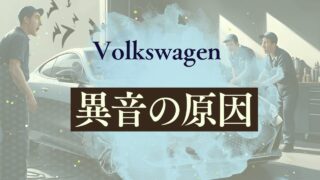Have you ever heard a high-pitched squeaking sound when slowing down your Volkswagen? It’s a common concern among VW owners, especially when braking at low speeds or approaching a stoplight. While it may seem minor at first, this squeaking noise can indicate a more serious brake-related issue that shouldn’t be ignored.
In this article, we’ll break down the common causes of squeaking when braking, what it means for your VW, and how much you can expect to pay for repairs.
✨ Quick Repair Cost Summary
| Cause | Repair | Estimated Cost (JPY/USD) |
|---|---|---|
| Worn brake pads | Replace pads | ¥15,000–¥25,000 / ~$100–$170 |
| Damaged brake rotors | Resurface or replace | ¥5,000–¥35,000 / ~$35–$240 |
| Pad-rotor mismatch | Apply anti-squeal compound | ¥3,000–¥6,000 / ~$20–$40 |
| Rust or dirt | Cleaning | ¥0–¥5,000 / $0–$35 |
| Caliper misalignment | Refit or adjust | ¥3,000–¥8,000 / ~$20–$55 |
🔊 When Does the Squeaking Occur?
Typical scenarios include:
- Braking at low speed
- Just before coming to a complete stop
- More noticeable in wet or humid conditions
- Squealing has gradually worsened over time
⚠ Common Causes of Squeaking Brakes in VW Vehicles
1. Worn Brake Pads
As brake pads wear down, the metal indicator may contact the rotor to alert you it’s time to replace them. This is the most common cause of squeaking.
Signs: High-pitched sound every time you brake.
Solution: Replace brake pads.
Cost: ¥15,000–¥25,000 (~$100–$170) for the front pads; double for front and rear.
2. Brake Rotor Wear or Warping
Over time, rotors can become grooved or warped from heat and pressure. Uneven surfaces cause squeaking and even vibration.
Signs: Squeaking continues after pad replacement; vibration during braking.
Solution: Resurface or replace rotors.
Cost: ¥5,000–¥10,000 ($35–$70) for resurfacing; ¥20,000–¥35,000 ($135–$240) for replacement.
3. Pad and Rotor Compatibility
Aftermarket pads may be harder than OEM rotors or simply not a good match, causing high-frequency squeals.
Signs: Squeaking after a recent brake job.
Solution: Apply anti-squeal compound or change pads.
Cost: ¥3,000–¥6,000 (~$20–$40)
4. Rust or Debris
Brake rotors can develop surface rust after rain or from sitting unused. Dust or small particles can also cause noise.
Signs: Noise right after starting the car, especially on rainy days.
Solution: Basic cleaning or light driving to clear debris.
Cost: Free to ¥5,000 ($0–$35)
5. Improper Installation or Caliper Issues
If brake components aren’t installed correctly, or if the caliper is misaligned, it may cause pad vibration and noise.
Signs: Squealing started after recent service.
Solution: Refit, grease application, or component adjustment.
Cost: ¥3,000–¥8,000 (~$20–$55)
⛔ Why You Shouldn’t Ignore Brake Squeaks
- Worn pads can lead to rotor damage and higher costs.
- Faulty brakes can cause reduced stopping power.
- Squealing can indicate safety risks and may fail inspections.
✅ DIY Checks Before Visiting a Shop
- When does the noise occur? (Only while braking?)
- Is it worse in rain or morning starts?
- Does the brake pedal feel different?
- Can you see pad thickness through the wheel?
Note your findings to share with your mechanic—it helps speed up diagnosis.
🚗 Choose a VW-Specialized Repair Shop
Volkswagen vehicles often require expert attention due to unique parts and diagnostic systems. For the best results, visit:
- Official VW dealers
- VW/Audi specialty shops
- Trusted import car repair garages
🌟 Summary: Squeaks Are a Sign, Not a Soundtrack
If your VW squeaks while slowing down, don’t ignore it. Whether it’s a worn pad or a more serious issue, early attention keeps you safer and your repair bills lower.
Stay alert, act early, and keep your Volkswagen driving smooth and silent.








コメント